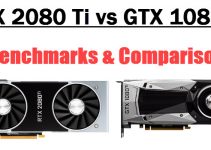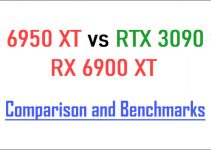The competitor of the GeForce RTX 5070 Ti has finally arrived with the launch of the Radeon RX 9070 XT from AMD. Radeon RX 9070 XT is the first card launched by AMD in the Radeon RX 9000 series, followed by Radeon RX 9070, a slightly slimmed-down version of the RX 9070 XT. RX 9070 XT is a powerful mid-range card for 1440p and 4K gaming. It comes with new features and supports new technology. Picking the right graphics card between them can confuse some buyers, so I will compare them on important parameters here.
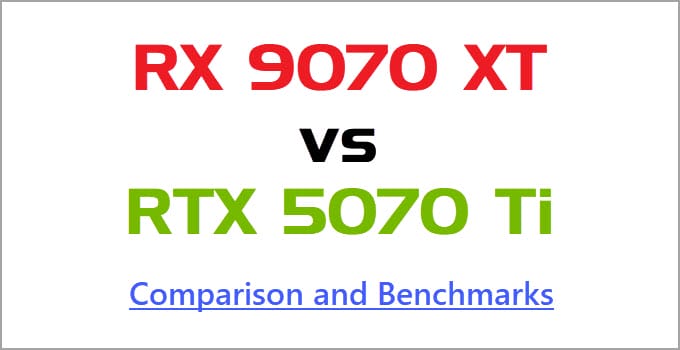
RX 9070 XT vs RTX 5070 Ti Comparison
Below is a comparison between RX 9070 XT and RTX 5070 Ti graphics cards based on their specifications, gaming performance, pricing, power consumption, and features.
GPU Architecture
Radeon RX 9070 XT is built on AMD’s latest RDNA 4 architecture on a smaller 4nm fabrication process. It uses Navi 48 XTX chip and has 4096 Stream Processors, 64 Ray Accelerators, and 128 AI Accelerators.
GeForce RTX 5070 Ti is built on Nvidia’s Blackwell GPU architecture on a 5nm manufacturing process. It uses GB205 GPU chip and has 6144 CUDA Cores, 48 RT Cores (4th Generation), and 192 Tensor Cores (5th Generation).
| RX 9070 XT | RTX 5070 Ti | |
| GPU Chip | Navi 48 XTX | GB203 |
| GPU Architecture | RDNA 4 | Blackwell |
| Fabrication Process | 4nm | 5nm |
| CUDA Cores/Stream Processors | 4096 Stream Processors | 8960 CUDA Cores |
| RT Cores | 64 Ray Accelerators | 70 (4th Generation) |
| Tensor Cores / | 128 AI Accelerators | 280 (5th Generation) |
Video RAM [VRAM]
RX 9070 XT has 16 GB GDDR6 memory with a 256-bit interface and runs at 20 Gbps, delivering a bandwidth of 640 GB/s. It also has a 64 MB Infinity Cache, an ultra-fast memory cache that can provide a higher peak memory bandwidth.
The RTX 5070 Ti has 16 GB of GDDR7 memory with a 256-bit interface. The memory runs at 28 Gbps and generates a bandwidth of 896 GB/s.
| RX 9070 XT | RTX 5070 Ti | |
| Memory Size | 16 GB GDDR6 | 16 GB GDDR7 |
| Memory Interface | 256-bit | 256-bit |
| Memory Speed | 20 Gbps | 28 Gbps |
| Memory Bandwidth | 640 GB/s | 896 GB/s |
| Infinity Cache | 64 MB | NA |
Features
These graphics cards support DirectX 12, OpenGL 4.6, Vulkan, AV1 Encode/Decode, Real-Time Ray Tracing, and variable refresh rate technologies G-Sync/FreeSync. RTX 5070 Ti and RX 9070 XT support PCIe 5.0 (Gen5). Regarding image upscaling technologies for increasing FPS in games, RTX 5070 Ti supports DLSS 4, while RX 9070 XT supports AMD FidelityFX Super Resolution (FSR 4). Regarding video output ports, RTX 5070 Ti supports DisplayPort 2.1b and HDMI 2.1b, while RX 9070 XT supports DisplayPort 2.1a and HDMI 2.1b.
| RX 9070 XT | RTX 5070 Ti | |
| Bus Interface | PCI Express 5.0 | PCI Express 5.0 |
| DirectX | 12 Ultimate | 12 Ultimate |
| OpenGL | 4.6 | 4.6 |
| Vulkan | 1.3 | 1.4 |
| SLI / CrossFire | NA | NA |
| VR Ready | Yes | Yes |
| G-Sync/FreeSync | Yes | Yes |
| HDMI 2.1 | HDMI 2.1b | HDMI 2.1b |
| DisplayPort 2.1 | DisplayPort 2.1a | DisplayPort 2.1b |
| AV1 Support (Encode/Decode) | Yes | Yes |
| Real-Time Ray Tracing | Yes | Yes |
| Deep Learning Super Sampling (DLSS) | NA | Yes (DLSS 4) |
| FidelityFX Super Resolution (FSR) | AMD FSR4 | NA |
Gaming Performance
Here are the gaming benchmarks of these cards at 1440p and 4K resolution in various latest AAA games.
1440p Gaming Benchmarks
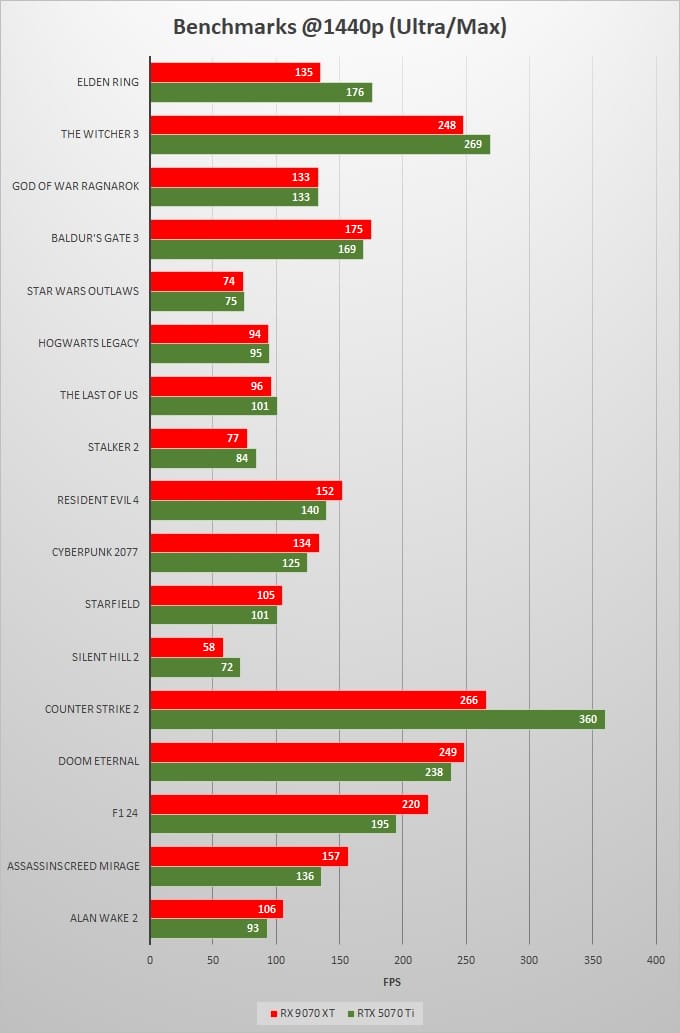
4K Gaming Benchmarks
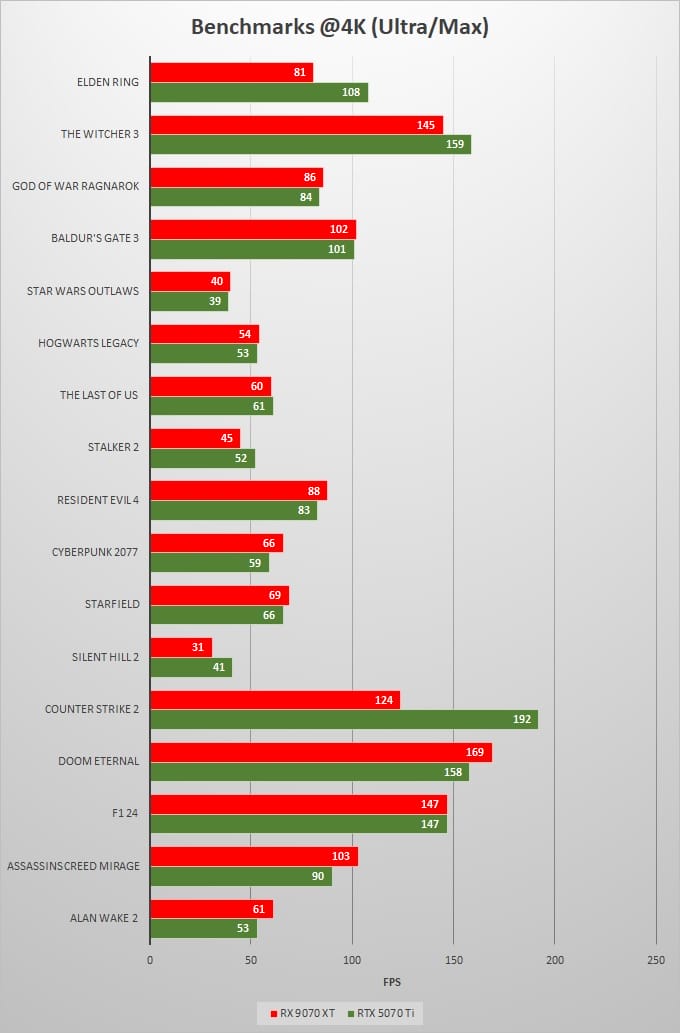
From the above benchmarks, we can see that, on average, RX 9070 XT is only 3 to 4 percent slower than RTX 5070 Ti.
Ray Tracing Performance
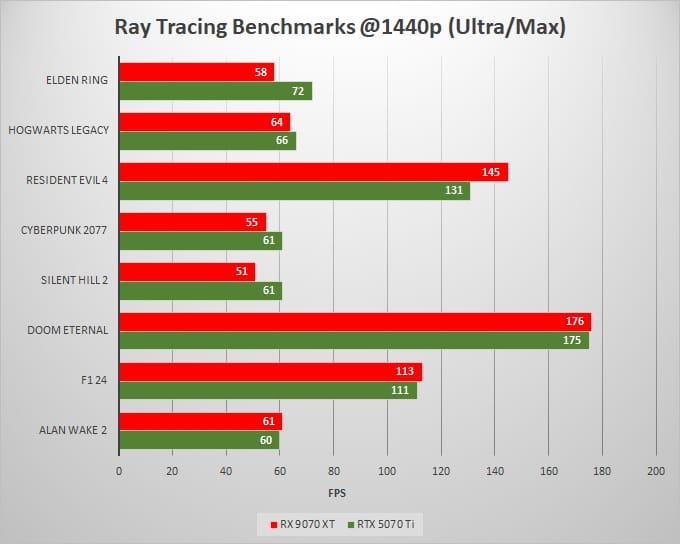
In Ray Tracing, RX 9070 XT is around 14 percent slower than RTX 5070 Ti.
Power Consumption
Both cards’ power consumption is almost the same, at around 300W. The RTX 5070 Ti uses a 16-pin connector for supplementary power, while the RX 9070 XT can use either an 8-pin PCIe or 16-pin connector, depending on the manufacturer and model.
| RX 9070 XT | RTX 5070 Ti | |
| Power Connector | 8-pin / 16-pin (Depending on the Model) | 16-pin 12V-2×6 HPWR |
| Power Consumption | 304W | 300W |
| Recommended PSU | 750W | 750W |
Pricing & Availability
The official MSRP for RX 9070 XT is 599 USD, while that of RTX 5070 Ti is 749 USD. The custom models of these cards from various AIB partners may cost more, and you can check the latest prices and different custom models of these cards from the links below.
Check RX 9070 XT Price on Amazon
Check RTX 5070 Ti Price on Amazon
RX 9070 XT vs RTX 5070 Ti Specifications
| RX 9070 XT | RTX 5070 Ti | |
| GPU Chip | Navi 48 XTX | GB203 |
| GPU Architecture | RDNA 4 | Blackwell |
| Fabrication Process | 4nm | 5nm |
| CUDA Cores/Stream Processors | 4096 Stream Processors | 8960 CUDA Cores |
| Ray Tracing Cores | 64 Ray Accelerators | 70 (4th Generation) |
| Tensor Cores | 128 AI Accelerators | 280 (5th Generation) |
| Memory Size | 16 GB GDDR6 | 16 GB GDDR7 |
| Memory Interface | 256-bit | 256-bit |
| Memory Speed | 20 Gbps | 28 Gbps |
| Memory Bandwidth | 640 GB/s | 896 GB/s |
| Bus Interface | PCI Express 5.0 | PCI Express 5.0 |
| DirectX | 12 Ultimate | 12 Ultimate |
| OpenGL | 4.6 | 4.6 |
| Vulkan | 1.3 | 1.4 |
| SLI / CrossFire | NA | NA |
| VR Ready | Yes | Yes |
| G-Sync/FreeSync | Yes | Yes |
| Power Consumption | 304W | 300W |
| Recommended PSU | 750W | 750W |
Final Words
From the above comparison, we can conclude that RX 9070 XT is a clear winner when it comes to the price-to-performance ratio. It is almost as fast as the RTX 5070 Ti and significantly cheaper based on the official MSRP. The power consumption of both these cards is nearly the same. The only advantage RTX 5070 Ti has is its slightly better performance in ray tracing. Let me know in the comment section below if you have any queries or opinions.
(*This post may contain affiliate links, which means I may receive a small commission if you choose to purchase through the links I provide (at no extra cost to you). Thank you for supporting the work I put into this site!)
